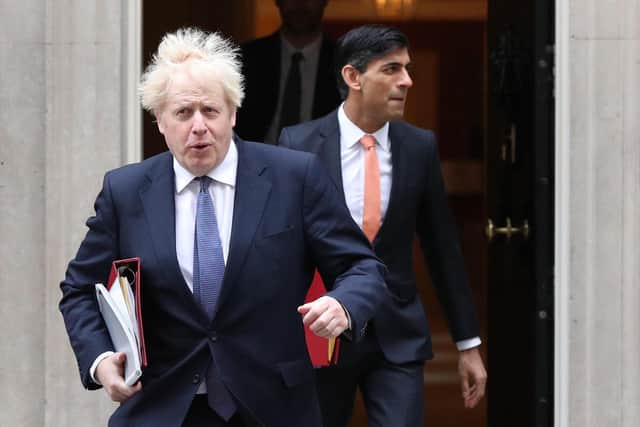Nightclubs to require vaccine passports with other activities to potentially follow, says Boris Johnson
Announcing the move in the House of Commons, vaccines minister Nadhim Zahawi said that evidence of a negative Covid-19 test would no longer be sufficient for entry.
Boris Johnson speaking at a Downing Street briefing from Chequers, added that opening up now meant that “inevitable” deaths and hospitalisations would take place now, rather than in the winter when transmission conditions for Covid-19 are better.


Advertisement
Hide AdAdvertisement
Hide AdThe Prime Minister said the escalating number of people being required to self-isolate was “simply a consequence of living with Covid”, adding the rising number of people in hospital and dying are “well within the margins of what our scientists predicted”.
He also warned that “some of life’s most important pleasures and opportunities are likely to be increasingly dependent on vaccination”.
The Prime Minister said: “I don’t want to have to close nightclubs again as they have elsewhere, but it does mean nightclubs need to do the socially responsible thing and make use of the NHS Covid pass.
“I should serve notice now that by the end of September, when all over-18s will have had their chance to be double jabbed, we are planning to make full vaccination the condition of entry to nightclubs and other venues where large crowds gather.”
Scotland moved to level zero restrictions on Monday, but unlike England nightclubs are not yet allowed to reopen. The reopening date earmarked for nightclubs in Scotland is August 9.
The announcement south of the border sparked an angry response from industry groups.
Michael Kill, chief executive officer of the Night Time Industries Association (NTIA), described the plans as an “absolute shambles” and a “chaotic U-turn”.
He said: “Eighty per cent of nightclubs have said they do not want to implement Covid passports, worrying about difficulties with enforcing the system and a reduction in spontaneous consumers, as well as being put at a competitive disadvantage with pubs and bars that aren’t subject to the same restrictions and yet provide similar environments.”
Advertisement
Hide AdAdvertisement
Hide AdPeter Marks, chief executive of REKOM UK – the UK's largest nightclub group – said: “To say we are disappointed by this government’s U-turn is an understatement.
"[Deputy chief medical officer] Jonathan Van Tam’s talk of his party in his garden shed shows how little this government and their scientists understand the modern club. Nightclubs have the best air ventilation systems in hospitality, retail and most other settings - with air changes on average every five minutes. Who else does that?”
Scottish Liberal Democrats MP Alistair Carmichael described vaccine passports as Covid ID cards that were “unworkable, expensive and divisive”.
“They would place a huge, unfair burden on local businesses, which have already been hit so badly by the pandemic and can’t afford the extra costs of enforcing this system,” he said.
"“The Government has U-turned on Covid ID cards so many times already. It should execute one final handbrake turn and rule them out for good.”
But Jeremy Hunt, Conservative chairman of the health and social care committee, questioned why the government was waiting until the end of September to implement the plans.
“If we’re going to introduce Covid vaccine passports for nightclubs by the end of September, which I support, why are we waiting until then, giving more weight to the concerns of people who want to go to nightclubs, than the additional extra cases waiting two months is likely to cause at a time when that growth in new cases is of such a concern?” he asked in the Commons.
A message from the Editor:
Thank you for reading this article. We're more reliant on your support than ever as the shift in consumer habits brought about by coronavirus impacts our advertisers.
If you haven't already, please consider supporting our trusted, fact-checked journalism by taking out a digital subscription.
Comments
Want to join the conversation? Please or to comment on this article.
